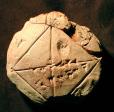
MAT 336 History of Mathematics
Spring 2006
 Index
Index Course description
Course description Syllabus
Syllabus  Schedule of Presentations
Schedule of Presentations
 |
MAT 336 History of Mathematics
|
 Index Index Course description Course description Syllabus Syllabus  Schedule of Presentations Schedule of Presentations |
Course Description |
MAT 200 or AMS 310 are prerequisites. This course will be addressed to students with substantial mathematical experience at the college level (understanding of proofs, in particular). The term papers will involve critical reading of secondary sources, with explicit reference to the primary.
The class meets twice a week for eighty minutes. In the steady state (starting
in week 4) each class will include two 15-minute student presentations.
Each Friday there will be a 20-minute quiz on the preceding week's material
(lectures, reading, suggested homework and student presentations).
Each student is responsible for two term papers, (March 17, May 5). The
first paper (10 pages) will be on the topic of the student's in-class presentation.
The second will be a longer work (15 pages) on another topic of the student's
choice. Students are required to submit their topic proposals, and
detailed outlines of their papers, by deadlines listed below and
in the syllabus.
Grades will be calculated using the following percentages:
Check the
homework for the week's reading assignments and
suggested exercises. These will not be collected, but similar material
may turn up on next week's quiz.
To guide your reading, concentrate on understanding
the details of the points mentioned in class. If we skipped a
certain portion of the section, especially a mathematically complicated
looking portion, you can skip it too.
Grading Criteria: Your presentations will be graded on the
clarity of expression, the
extent to which your presentation is well organized, the quality of
information conveyed, the extent to which you've added new information
(information not already covered in class), the extent to which you've
considered the important issues and are able to answer the group's
questions about them, and the extent to which you've help spark new
questions from other students.
Speaking in front of a group can be scary (..that's an understatement..),
but the atmosphere will be supportive and encouraging. During your talk
the rest of us will be working hard to understand your material. Since
you're the speaker we'll be asking questions so that you can help us
understand. When we ask a question you don't need to think quickly, just
clearly. If some of your answers are "I didn't think about that; I'll
answer it next time," that's OK. With time, you will gain experience that
will enable you to respond to challenging or provocative questions on the
spot.
Thanks to Dr. Chris Lott of Drew University for the
above advice on presentationsContent, Prerequisites, Requirements, Grades
MAT 336 is a document-based history of mathematics. It moves chronologically
from Ancient Egypt and Mesopotamia to the start of the 20th century. In each
historical period we will work with documents from that period, in as original
a form as we can handle. We will attempt to replicate the original mathematics
in each case (doing calculations, for instance, with the tools available in that period); at
the same time we will examine that mathematics in the light of present-day
science, and with an eye to the lessons it can teach us about how humans do
mathematics, and how they learn mathematics.
Note that there will be no final examination.Contact Information, Office hours
Reading Assignments and Suggested
Exercises
Term papers
In-class presentations
The schedule for student in-class
presentations is subject to change, but any changes will be announced in
class (and recorded here). Each student presentation is 15 minutes.